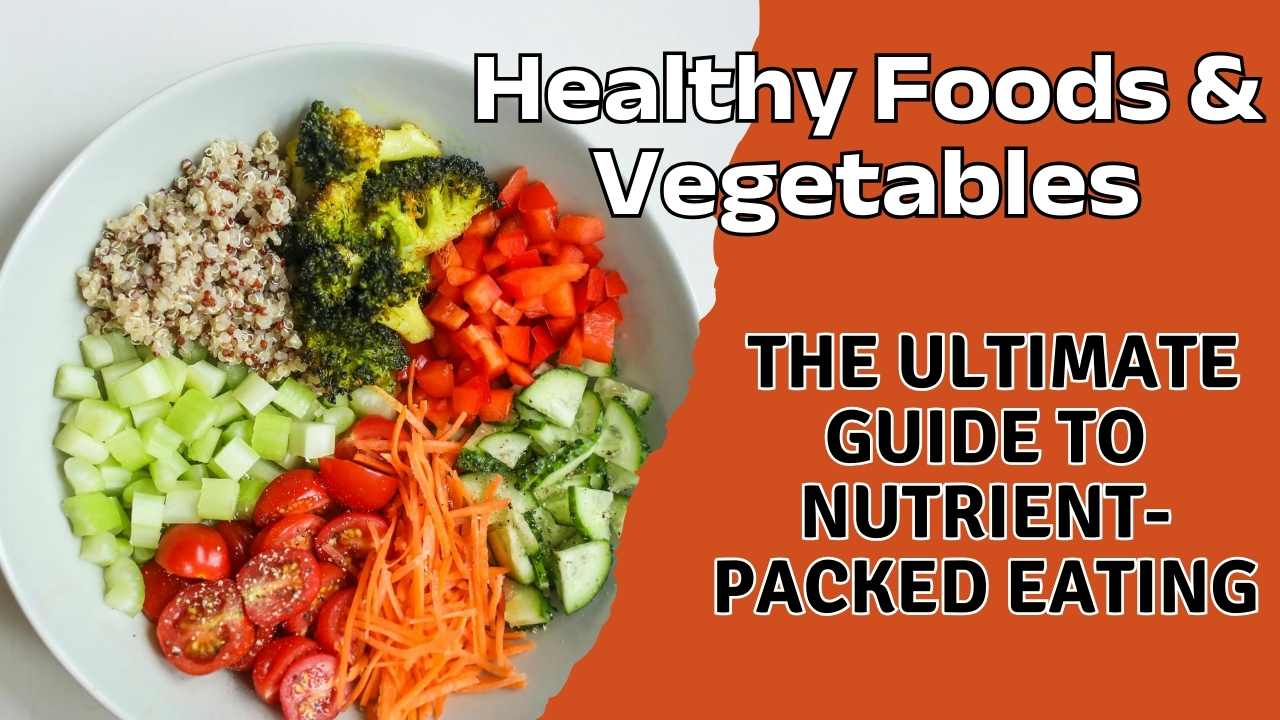Introduction:
Healthy Foods & Vegetables: A balanced diet rich in healthy foods and vegetables is essential for maintaining overall health and well-being. Vegetables are packed with essential vitamins, minerals, fiber, and antioxidants that help support a strong immune system, boost digestion, and prevent chronic diseases. Healthy eating is not just a trend; it’s a lifestyle that can transform your physical, mental, and emotional well-being.
The foundation of a healthy diet lies in consuming nutrient-dense foods, particularly vegetables and other whole foods, which provide essential vitamins, minerals, and antioxidants. These nutrients help boost immunity, improve digestion, and reduce the risk of chronic diseases. In this blog, we’ll explore the best healthy foods and vegetables, their benefits, and practical ways to include them in your meals.
However, with the abundance of available food options, knowing which vegetables and foods provide the most benefits can be overwhelming. This guide explores the best nutrient-dense foods and vegetables, their health benefits, and how to incorporate them into your daily diet for optimal health. Let’s embark on a journey to discover how you can fuel your body with the best nature has to offer.
আরো পড়ুন
1. Why Are Healthy Foods and Vegetables Important?
Healthy foods and vegetables are the cornerstone of a balanced diet. They are low in calories but high in essential nutrients, making them ideal for maintaining a healthy weight and preventing diseases. Here’s why they matter:
- Rich in Nutrients: Vegetables like spinach, kale, and broccoli are packed with vitamins A, C, and K, as well as minerals like iron and calcium.
- High in Fiber: Foods like beans, lentils, and whole grains promote digestive health and keep you full longer.
- Antioxidant Powerhouses: Berries, carrots, and sweet potatoes are loaded with antioxidants that fight inflammation and oxidative stress.
- Disease Prevention: A diet rich in vegetables and healthy foods can lower the risk of heart disease, diabetes, and certain cancers.
2. Top 10 Nutrient-Packed Vegetables
Not all vegetables are created equal. Some foods stand out for their exceptional nutritional value. Here are the top 10 vegetables you should include in your diet:
- Spinach: Rich in iron, folate, and vitamin K, spinach supports bone health and boosts energy levels.
- Broccoli: Packed with vitamin C, fiber, and sulforaphane, broccoli is a powerhouse for immunity and detoxification.
- Carrots: High in beta-carotene, carrots promote eye health and improve skin texture.
- Sweet Potatoes: A great source of vitamin A and potassium, sweet potatoes support heart health and vision.
- Kale: Known as a superfood, kale is loaded with vitamins A, C, and K, as well as calcium and antioxidants.
- Bell Peppers: Colorful bell peppers are rich in vitamin C and antioxidants, which boost immunity and skin health.
- Zucchini: Low in calories but high in fiber, zucchini aids digestion and weight management.
- Cauliflower: A versatile vegetable, cauliflower is rich in vitamins C and K and can be used as a low-carb alternative.
- Beets: High in nitrates, beets improve blood flow and enhance athletic performance.
- Tomatoes: Rich in lycopene, tomatoes support heart health and reduce the risk of certain cancers.
Read More–Islami Bank Student account
3. Healthy Foods to Pair with Vegetables:
While vegetables are essential, pairing them with other healthy foods can create a balanced and satisfying meal. Here are some great options:
- Lean Proteins: Chicken, turkey, tofu, and legumes complement vegetables and provide essential amino acids.
- Whole Grains: Quinoa, brown rice, and oats add fiber and keep you full longer.
- Healthy Fats: Avocado, nuts, seeds, and olive oil enhance nutrient absorption and add flavor.
- Fruits: Berries, apples, and citrus fruits add natural sweetness and extra nutrients.
4. How to Incorporate More Vegetables into Your Diet
If you struggle to eat enough vegetables, here are some practical tips:
- Start Your Day with Veggies: Add spinach or peppers to your morning omelet.
- Snack Smart: Keep carrot sticks, cucumber slices, or cherry tomatoes handy for quick snacks.
- Blend Them: Add kale or spinach to your smoothies for a nutrient boost.
- Experiment with Recipes: Try new dishes like roasted vegetable bowls, stir-fries, or vegetable soups.
- Hide Them: Grate zucchini or carrots into pasta sauces or baked goods.
5. The Role of Organic vs. Conventional Vegetables
The debate between organic and conventional vegetables is ongoing. Here’s what you need to know:
- Organic Vegetables: Grown without synthetic pesticides or fertilizers, organic vegetables may have fewer chemical residues. However, they can be more expensive.
- Conventional Vegetables: More affordable and widely available, conventional vegetables are still nutritious and safe to eat. Washing them thoroughly can remove most pesticide residues.
6. Seasonal Eating: Why It Matters
Eating seasonal vegetables ensures you get the freshest and most nutrient-dense produce. Seasonal eating also supports local farmers and reduces your carbon footprint. For example:
- Spring: Asparagus, peas, and radishes.
- Summer: Tomatoes, zucchini, and bell peppers.
- Fall: Pumpkins, squash, and Brussels sprouts.
- Winter: Kale, carrots, and sweet potatoes.
7. Common Myths About Healthy Foods and Vegetables
Let’s debunk some common misconceptions:
- Myth 1: Frozen vegetables are less nutritious than fresh ones.
Fact: Frozen vegetables are often flash-frozen at peak ripeness, retaining their nutrients. - Myth 2: You need to eat raw vegetables to get the most benefits.
Fact: Cooking can enhance the bioavailability of certain nutrients, like lycopene in tomatoes. - Myth 3: All vegetables are low in calories.
Fact: Starchy vegetables like potatoes and corn are higher in calories but still nutritious in moderation.
8. Delicious and Easy Recipes to Try:
Here are two easy recipes to get you started:
1. Rainbow Veggie Stir-Fry
- Ingredients: Bell peppers, broccoli, carrots, zucchini, tofu, soy sauce, garlic, and ginger.
- Instructions: Sauté garlic and ginger, add chopped vegetables and tofu, and stir-fry until tender. Add soy sauce and serve with brown rice.
2. Spinach and Berry Smoothie
- Ingredients: Spinach, mixed berries, banana, almond milk, and chia seeds.
- Instructions: Blend all ingredients until smooth and enjoy as a refreshing breakfast or snack.
Frequently Asked Questions
Q1: How many servings of vegetables should I eat daily?
A: It is recommended to consume at least 5 servings (2.5 cups) of vegetables daily for optimal health.
Q2: What are the best vegetables for weight loss?
A: Leafy greens like spinach and kale, along with fiber-rich vegetables like broccoli and carrots, help promote satiety and support weight loss.
Q3: Are frozen vegetables as nutritious as fresh ones?
A: Yes, frozen vegetables retain most of their nutrients and can be a convenient and cost-effective option.
Q4: Can eating too many vegetables be harmful?
A: While vegetables are essential for a healthy diet, excessive consumption may lead to digestive discomfort due to high fiber content.
Q5: How can I make vegetables taste better?
A: Try roasting them with herbs and olive oil, adding spices, or incorporating them into flavorful dishes.
Q6. What are the healthiest vegetables to eat daily?
A.Spinach, broccoli, kale, carrots, and sweet potatoes are some of the healthiest vegetables to include in your daily diet.
Q7. Can I get enough protein from vegetables?
A.While vegetables are not complete protein sources, combining them with legumes, nuts, and seeds can help you meet your protein needs.
Q8. Are canned vegetables healthy?
A. Canned vegetables can be healthy, but choose options with no added salt or sugar. Rinse them before use to reduce sodium content.
Q9. How can I make vegetables taste better?
A. Try roasting, grilling, or sautéing vegetables with herbs, spices, and healthy fats like olive oil.
Q10. How many servings of vegetables should I eat per day?
The recommended intake is at least 5 servings (about 400 grams) of vegetables per day for adults.
Conclusion:
A diet rich in healthy foods and vegetables is the foundation of a healthy lifestyle. By incorporating nutrient-dense vegetables into your meals, you can improve digestion, boost immunity, and lower the risk of chronic diseases. Start small by adding one or two new vegetables to your diet each week and explore different cooking methods to make them more enjoyable. Prioritizing fresh, organic, and minimally processed foods will help you maintain long-term health and wellness.






